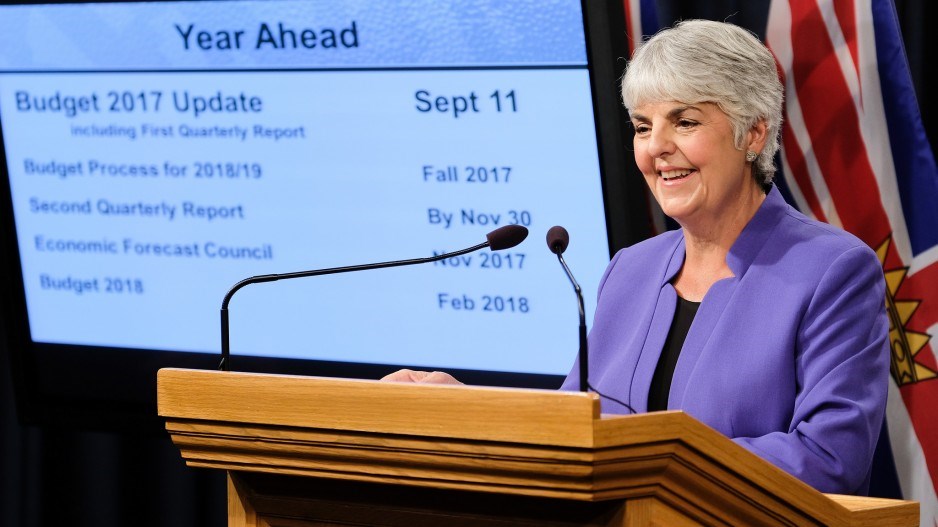Business groups in B.C. are generally applauding the BC NDP government’s first full budget for being balanced and for addressing affordability issues, but are slamming the government’s plan to transfer nearly $2 billion worth of MSP revenue onto the shoulders of small and medium-sized businesses with a new payroll tax.
The B.C. government will increase spending by $5.2 billion over three years and plans to balance its books with a suite of new taxes or tax hikes worth $4.4 billion over that time period.
New tax revenue in the fist fiscal year would be $880 million and would soar to $2.2 billion in 2019-2020, once the payroll tax is fully implemented.
The Greater Vancouver Board of Trade (GVBOT) is giving the NDP government’s budget a C+ grade.
“We certainly applaud government’s efforts on easing the burden of high housing costs and increasing access to child care, but in introducing a payroll tax to offset lost MSP premium revenues this budget delivers another meaningful blow to small to medium employers, especially in the service and technology sectors,” said GVBOT CEO Iain Black.
"Our initial assessment is that this new tax will increase overall payroll costs for our members by several hundred million dollars a year," added Greg D'Avignon, CEO of the Business Council of BC.
The BCBC also notes that the government expects a fairly drastic decline in new housing starts (27% this year), which underscores the need to encourage growth in export sectors – a theme largely missing in the budget.
Because the government’s three-year plan projects balanced budgets, and projects a debt-to-GDP ratio that would peak at 15.9%, credit rating agencies are likely to continue to give B.C. a triple AAA credit rating, GVBOT said.
But transferring close to $2 billion worth of MSP revenue onto the business sector with the new employer health tax will translate into a significant new tax burden for many businesses.
Larger employers tend to cover employees’ MSP premiums, so when they are replaced with a payroll tax, there will be negligible impact on them.
But most small and medium-sixed business either don’t cover their employees’ MSP premiums, or cover only part of them, so for them a payroll tax could be a significant new cost.
“Because many larger corporations already pay this on behalf of their employees (as a benefit), the incremental impact of this payroll tax will overwhelmingly affect small-midsize businesses the most,” the GVBOT report card warns.
“We also note with concern that the new small business payroll tax comes on top of previously announced minimum wage increase (of 34% over four years), an increase in the general corporate tax rate of 9.1%, a 14% increase to the personal income tax rate of most ‘skilled professionals’, and a previously scheduled increase in the B.C. carbon tax of 16%.”
“Our members like to see balanced budgets,” said BC Chamber of Commerce president Litwin, “especially with capital investments in infrastructure, education, trade, and housing that support many businesses in the province through direct and indirect job creation. But this budget looks like it's being balanced on the back of business through accumulating tax increases.
“This new tax will have a negative effect on growth and investment.”
“We appreciate the efforts to keep the budget balanced and ensure financial stability for the next (two to three) years,” said Surrey Board of Trade CEO Anita Huberman.
“However, balancing the budget through increasing business-focused taxes, such as the new Employer Health Tax, will be a hard sell to our members.”
The Independent Contractors and Business Association (ICBA) notes that the budget is balanced, but precariously so.
“With a razor-thin surplus dependent on a lot of things going right, B.C. taxpayers should be alarmed that the NDP government has stopped paying attention to growing the economy.”
The ICBA also notes there is no mention in the government’s capital budget of the George Massey Tunnel, which the previous Liberal government planned to replace with a $3.5 billion 10-lane bridge, and no mention of either a proposed light rail transit system for Surrey or the Broadway subway.
That doesn’t necessarily mean there will be no money for the tunnel, should a government review conclude it is a high priority, B.C. Finance Minister Carole James told reporters in a pre-budget briefing.
“You will see from our capital budget that we continue to have room,” she said. “It’s still very manageable, our debt-to-GDP, and so that’s maybe a future consideration coming forward,” James said.
As for Andrew Weaver and his Green Party, which has the power to bring the government down over confidence votes like budgets, Weaver’s response to Tuesday’s budget was “good, but."
“It is refreshing to see a provincial budget that puts people back at its centre, but there is still much work to be done to meet British Columbians’ expectations for the future,” the Green Party Leader said.
“It is encouraging to see such a significant emphasis on child care. This is a core commitment to our Confidence and Supply Agreement and we have been working diligently to consult with the government on how we can best achieve our shared goals.
“However, we are still concerned that the challenges presented by the emerging economy, and the challenge of climate change in particular are not receiving adequate attention. Without a clear vision and decisive action we risk undermining all of the progress we could make on childcare and housing.
“Over the coming days and weeks our caucus will be seeking more information from the government about the specifics of their budget policies.”
See budget overview here.
[email protected]
@nbennett_biv




